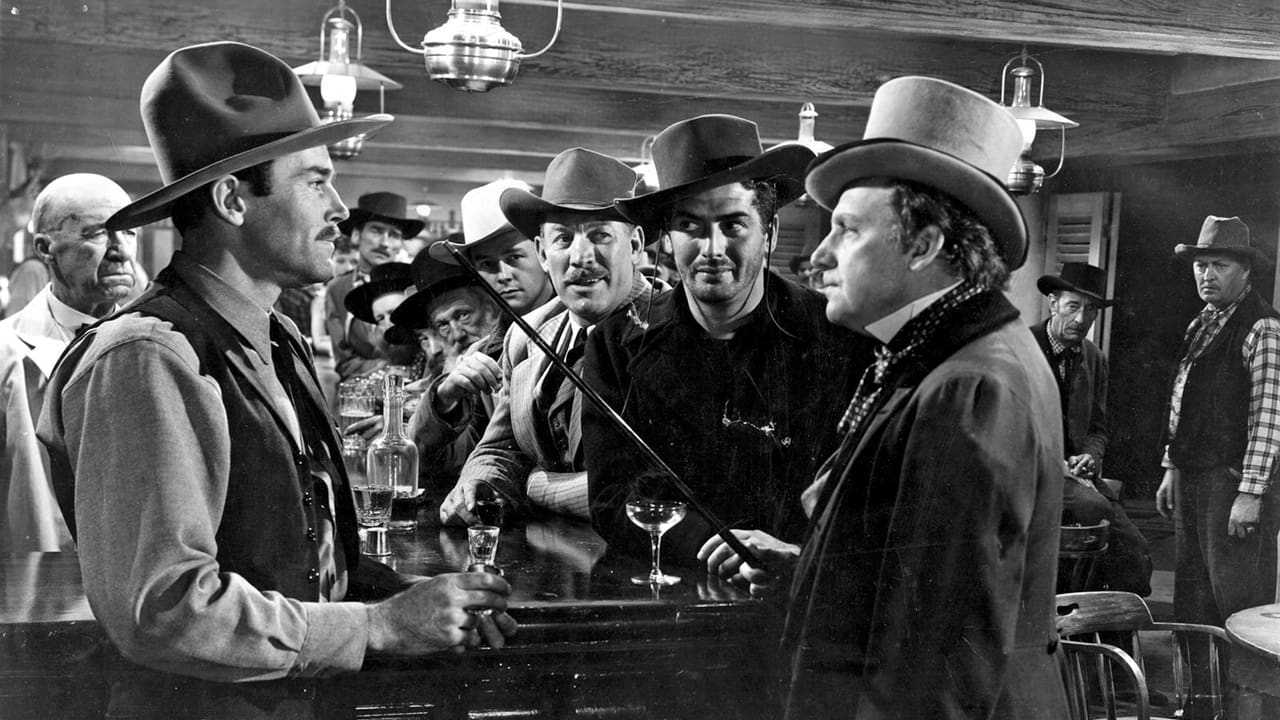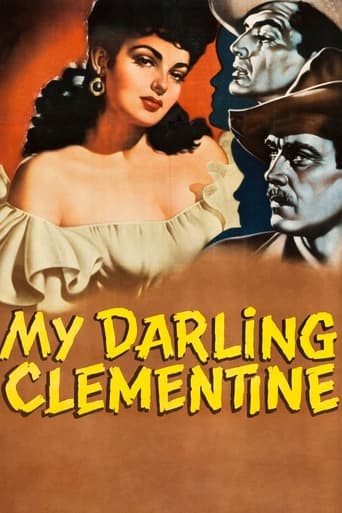

Wonderful character development!
... View MoreEasily the biggest piece of Right wing non sense propaganda I ever saw.
... View MoreThis is a dark and sometimes deeply uncomfortable drama
... View MoreAn old-fashioned movie made with new-fashioned finesse.
... View MoreTombstone is a tangle of cattleman, cowboys, Indians and women of distinction. Henry Fonda, as Wyatt Earp, calms the town, as sheriff, from a chair he leans back in. His brothers, Ward Bond, as Morgan, and Tim Holt, as Virgil, protect him loyally. Morgan sums up the town with, "There's probably a lot of nice people around here – we just ain't met 'em." Victor Mature, as Doc Holiday, befriends the sheriff, if only to carry out his justice upon the town. Chihuahua, played by the fiery Linda Darnell, adds a touch of trouble. The Clantons add a ton of trouble. Pa Clanton, Walter Brennan, in an uncharacteristic role as a rotten father, leads his sons in the bad western behavior of rustling cattle and murdering. John Ireland, a Ford favorite plays a smallish part as Billy Clanton. Cathy Downs, as the flower-like Clementine Carter, arrives in town just in time to rescue, and be rescued by, Wyatt, as a thread of human decency emerges. Even the bartender, Mac, played by the durable J. Farrell McDonald, has his moments as the town's emblematic father figure – like when Wyatt asks him simply, "Mac, have you ever been in love?" – his answer is a classic line, not to be forgotten. Alan Mowbray, the itinerant English actor and sot, has a heartfelt Shakespearean moment with Doc Holiday. The film is a series of showdowns between the all the main characters. The inevitable finale plays out with Ward Bond having perhaps his greatest cinematic moment – ever so brief and to the point. The film is not historically accurate, but it's a beautifully filmed and acted portrayal of a western town. Much of the beauty and realism is in the details. The sartorial Earps. The tenderness of graveside and bedside moments. The rowdy shouts of barroom patrons during a backroom operation. Barking dogs at dawn on showdown day. Ford, who was a painter before becoming a film director, frames every shot to move the story along pictorially. His close ups are vivid and memorable. His final painted scene gives hope to the new West.
... View More. . . ten men their lives in MY DARLING CLEMENTINE. When Henry Fonda turns down Walter Brennan's impromptu post-sunset low-ball cattle herd purchase offer in the middle of the Arizona desert, the men do NOT exchange business cards. But you can tell by the look on Walt's face at he hotel desk later that evening that IF Hank had told him out in the desert that he was "Wyatt Earp," Walt never would have killed Wyatt's little brother and stolen the Earp cattle herd. Another Earp, Doc Holliday, two of their anonymous allies, and all five of Walt's clan then bite the dust (not to mention Chihuahua, who doesn't count because she's not a guy, she's not White, and she's not even Doc's dog!). Besides Jimmy's demise, not much happens for the first hour plus of MY DARLING. We get a smattering of Shakespeare, a smidgen of faro (which seems to be some sort of Old Timey card game), a Doc with too many women and too little breath, and a sheriff who's reluctant to meet a woman or mete out death. Then Walt has to find out that DUST BE MY DESTINY the hard way.
... View More. . . almost manages to bamboozle movie-goers that Evil is Good in MY DARLING CLEMENTINE. And this is without so much as a cameo appearance by Ford's personal Frankenstein Monster, John Wayne. Unlike Wayne's nemesis director, Frank Capra of IT'S A WONDERFUL LIFE, Ford's vision of the America he's promoting is more aptly titled IT'S A FASCIST'S PARADISE. Therefore, MY DARLING CLEMENTINE predicates ALL of its events upon the opening 1882 murder of poor Jimmy Earp, at the tender age of 18, by Evil Pops Clanton (Walter Brennan). Trouble is, as Western historian Andrew C. Isenberg documents in the definitive Criterion CLEMENTINE, James Earp was Wyatt's OLDER brother, and this Jimmy expired superannuated in 1926! The Earps were NOT cattlemen, either, as Ford would have it, and only dabbled occasionally in "law enforcement" TO PROTECT THE E^RP FAMILY PROSTITUTION AND CARD-CHEATING BUSINESSES. Like one of today's Chicago cops, it was Wyatt Earp himself who EXECUTED unarmed business rivals as a crooked "lawman." Anyone acquainted with the rest of John Ford's films (or even the Wayne flicks directed by someone else) is familiar with the pattern this mendacious pair of so-called "Hollywood Icons" used in doing their Devil's Work to tear down American Core Values and our Constitution. They were the Fox "News" of the 1900s: Unfair and Unbalanced. Though Wayne somehow missed 20th Century Fox's CLEMENTINE, one of Ford and Wayne's main henchmen--Ward Bond--plays a key Earp role here. Naturally.
... View MoreDespite the title, this film does not tell the story of the "miner, forty-niner", who dwelt with his daughter "in a cavern, in a canyon, excavating for a mine" during the California Gold Rush. It is rather one of several Westerns about Wyatt Earp and the Gunfight at the OK Corral, although "Oh My Darling, Clementine" serves as the theme song, even though it was not written until 1884, three years after the Gunfight. That, however, is far from being the only liberty which this movie takes with history. In this version the Earp brothers are driving cattle to California and are passing through Tombstone when their cattle are rustled and James, the youngest brother, is shot dead by the Clanton gang under the leadership of their patriarch Old Man Clanton. Seeking to avenge his brother's murder, Wyatt takes the job of town marshal and makes the acquaintance of Doc Holliday, originally a surgeon from Boston but now a local gambler. The two men initially take a dislike to one another, but realise that they need to work together against the Clantons, especially after another Earp brother, Virgil, is murdered by them. During the Gunfight Wyatt, his surviving brother Morgan and Doc take on the Clantons; they emerge victorious, but Doc is fatally wounded. Another important theme involves a love-triangle between Doc, his former sweetheart from back East, and his mistress Chihuahua, a fiery Mexican girl. (And, in the universe inhabited by Hollywood screenwriters, what Mexican girl is anything other than "fiery"?)What is wrong with the above synopsis? Well, from a historical perspective, just about everything. The Earps were never cattle drovers. James Earp was the oldest of the brothers, not the youngest, and was not murdered. He died of natural causes at the age of 85 in 1926. Old Man Clanton died before the Gunfight. Wyatt was not town marshal of Tombstone; Virgil held that position. Wyatt and Doc were close friends and knew one another before the Earps arrived in Tombstone. Doc was originally from Georgia, not Boston, and was a dentist rather than a surgeon. He survived the Gunfight unscathed, dying of tuberculosis six years later. Like James, Virgil was not murdered; he survived an attempt to kill him several months after the Gunfight (not before it) and lived until 1905. The film even gets the year and time of day wrong. The Gunfight at the O.K. Corral took place on October 26th 1881, at about 3 pm, but here the date is given as 1882 and the Gunfight takes place at dawn. Chihuahua and Doc's ex-lover are both fictitious characters. The latter is given the name Clementine Carter, presumably because the filmmakers needed to find some justification, however spurious, for their title and for using that song. There is, however, no rule which says that historical films have to be 100% historically accurate or which forbids directors and scriptwriters from rearranging historical fact in order to suit the story they want to tell. If there were such a rule, some very great films could never have been made. There seems to be a widely-held opinion that "My Darling Clementine" falls within the category of Very Great Films; an opinion I am unable to share. It may be a good film, but falls some way short of being a great one, although my reasons for saying so have nothing to do with its lack of fidelity to historical truth. Nor do they have much to do with political correctness, even though, if judged by the standards of 2014, John Ford would certainly be found wanting on that particular score, both here and in many of his other movies. Quite apart from the ethnic stereotyping of Mexican women we also have the scene where Chihuahua is unceremoniously dumped in the horse-trough and there are disobliging references to Indians as violent drunkards who should stay on their reservations and out of any places where decent white folks might live. Henry Fonda's Wyatt Earp was perhaps rather too quiet and restrained for my taste; I preferred the interpretations of Burt Lancaster in "Gunfight at the OK Corral" and Kevin Costner in "Wyatt Earp", both of whom seemed to bring a greater presence and solidity to the role. I felt that the powerfully built, healthy-looking Victor Mature was miscast as the supposedly frail, tubercular Doc; a few obviously feigned coughing-fits were not enough to convince me that he was seriously ill. The changes to the historical facts made in this film have the effect of making Holliday a tragic hero and a central figure in the story, arguably more important than Wyatt Earp himself, and I felt that Mature did not really have the scope as an actor or the range of emotions needed for the role. On the positive side the black-and-white photography of the Western landscapes is, as one might expect from Ford, wonderful, although all those shots of Monument Valley suggest that he has relocated Tombstone from Arizona into Utah. (Is it a Federal offence to transport a town across State lines?) The gunfight scene is well staged, the musical score is a fine one and there are some good performances in supporting roles, notably from two lovely young actresses, Linda Darnell and Cathy Downs, as Chihuahua and Clementine, and from Alan Mowbray as the eccentric British actor Granville Thorndyke. (His name is derived from two real British actors, Harley Granville Barker and Russell Thorndike). "My Darling Clementine" is not my favourite version of the Wyatt Earp story; that would probably be "Gunfight at the OK Corral" It is a very decent Western adventure, but I just can't see it as a great all-time classic. 7/10
... View More